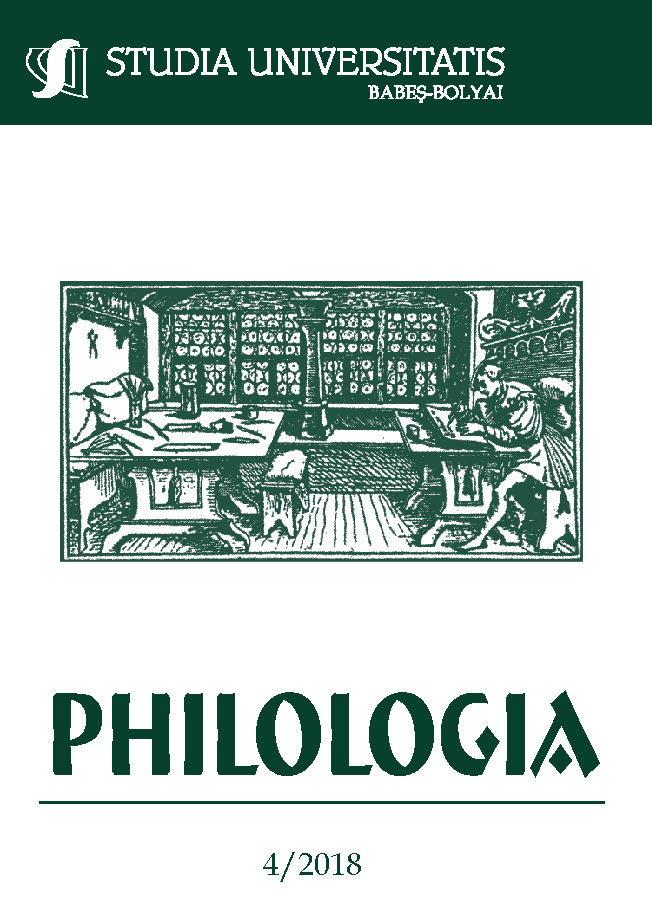IRISH OVERDETERMINATION: STRATEGIES FOR ENTERING AND LEAVING THE GAELTACHT
DOI:
https://doi.org/10.24193/subbphilo.2018.4.02Keywords:
Irish, Gaelic, identity, racism, authenticity, language, migration.Abstract
Irish Overdetermination: Strategies for Entering and Leaving the Gaeltacht. Irish and Gaels are terms that refer to historical and contemporary peoples. Both terms, however, are overdetermined, freighted both with negative stereotypes and impossible standards of cultural authenticity, such that the Irish and the Gaelic part in historical processes is distorted. This article looks at a difficult history in which Gaelic Ireland was nearly destroyed, yet from the eighteenth century, Gaelic heritage was accumulated in the capital, later providing fodder for a linguistic and cultural revival movement that reshaped modern Ireland. Marginal and yet central to modern Irish identity, the Gaelic inheritance today is threatened and thriving, and the Irish language is a minority language that has a superior constitutional standing to majority English.
Rezumat. Supra-determinare irlandeză: strategii pentru intrarea și ieșirea din Gaeltacht. Irlandezi și Gaels sunt termeni care se referă la popoare istorice și contemporane. Ambii termeni, însă, sunt supra-determinați, încărcați atât de stereotipii negative cât și de standarde imposibile de autenticitate culturală, astfel încât partea irlandeză și cea gaelică în procesele istorice suferă distorsiuni. Articolul de față discută o istorie dificilă în care Irlanda gaelică a fost aproape distrusă, și totuși, începând din secolul XVIII, moștenirea gaelică s-a acumulat ca un capital, furnizând mai târziu materie primă pentru o micare de renaștere lingvistică și culturală care a modelat Irlanda modernă. Marginală și totuși centrală în identitatea modernă irlandeză, moștenirea gaelică astăzi e pe atât de amenințată pe cât de înfloritoare, iar limba irlandeză e o limbă minoritară care se bucură de un statut constituțional superior englezei majoritate.
Cuvinte cheie: Irlandez, gaelic, identitate, rasism, autenticitate, limbaj, migrațiune.
References
Bauman, Zygmunt. 1990. “Modernity and Ambivalence”. In Global Culture: Nationalism, Globalization and Modernity. Edited by Mike Featherstone. London: Sage, 1990, 143-70.
Bauman, Zygmunt. 2004. Identity. Cambridge, UK: Polity.
Beck, Ulrich. 2001. "Zombie Categories: Interview with Ulrich Beck" (by Jonathan Rutherford). In Individualization. Edited by Ulrich Beck and Elisabeth Beck-Gernsheim, 202-13.
Beck, Ulrich and Beck-Gernsheim, Elisabeth. 2001. Individualization. London, Thousand Oaks and New Delhi: SAGE Publications.
Bergin, O. 1970. Irish Bardic Poetry. Dublin: The Dublin Institute for Advanced Studies.
Boffey, Daniel. 2018. “Don't say cheese: Amsterdam turns against English usage in shops”. The Guardian, 26 January.
Boswell, James. 1999 [1791]. The Life of Samuel Johnson. Ware: Wordsworth Classics.
Casanova, Pascale. 2004. The World Republic of Letters. Translated by M. B. DeBevoise. Cambridge, MA: Harvard University Press.
Chesterton, G. K. 1911. The Ballad of the White Horse. 2nd ed. London: Methuen & Co. Ltd.
Coimisiún na Gaeltachta Report. 1925. Dublin: The Stationery Office. https://aran.library.nuigalway.ie/handle/10379/2586
Croker, T. C. 1844. The Keen of the South of Ireland. London: The Percy Society.
Dinneen, P. S. 1927. Foclóir Gaedhilge agus Béarla: An Irish-English Dictionary. Dublin: Irish Texts Society.
Dundes, Alan. 1975. “The Devolutionary Premise in Folklore Theory”. In Analytic Essays in Folklore. Edited by Alan Dundes. The Hague, Paris & New York: Mouton, 17-27.
Dunne, Tom. 1989. “Haunted by History: Irish Romantic Writing 1800-1850”. In Romanticism in a National Context. Edited by Roy Porter & Miklaus Teich. Cambridge: Cambridge University Press, 68-91.
Gaelscoileanna. 2017. http://www.gaelscoileanna.ie/en/about/statistics/
Henley, Jon. 2018. “Icelandic language battles threat of ‘digital extinction’”. The Guardian, 26 February.
Leerssen, J. 1996. Remembrance and Imagination: Patterns in the Historical and Literary Representation of Ireland in the Nineteenth Century. Cork: Cork University Press.
Mac Craith, Mícheál. 2005. “The Political and Religious Thought of Florence Conry and Hugh Mac Caughwell”. In The Origins of Sectarianism in Early Modern Ireland. Edited by Alan Ford and John McCafferty. Cambridge: Cambridge University Press, 183-202.
Mac Gabhann, Lorcán. 2004. “Gaelscoileanna: Pluralism at work in the Irish education system or a continuing problem for successive governments?” In 'Who Needs Irish?' Reflections on the Importance of the Irish Language Today. Edited by Ciarán Mac Murchaidh. Dublin: Veritas, 94-107.
McKibben, S. 2010. Endangered Masculinities in Irish Poetry 1540-1780. Dublin: University College Dublin Press.
META-NET. 2018. Multilingual Europe Technology Alliance. http://www.meta-net.eu/whitepapers/press-release
Ó Buachalla, B. 1987. “Foreword” to 1987 reprint. In Foras Feasa ar Éirinn le Seathrún Céitinn, D.D. The History of Ireland by Geoffrey Keating, D.D. Part I. Edited by David Comyn. London: Irish Texts Society [1902], two–nine.
Ó Ciosáin, N. 1998. “Boccoughs and God’s Poor: Deserving and Undeserving Poor in Irish Popular Culture”. In Ideology and Ireland in the Nineteenth Century. Edited by Tadhg Foley and Seán Ryder. Dublin: Four Courts Press, 93-99.
Ó Crualaoich, Gearóid.1986. “The Primacy of Form: A ‘Folk Ideology’ in de Valera’s Politic s”. In De Valera and His Times. Edited by J.P. O’Carroll and John A. Murphy. Cork: Cork University Press, 47-61.
Ó Duilearga, Séamus. 1977. Leabhar Sheáin Í Chonaill. Dublin: Comhairle Bhéaloideas Éireann.
Oxford English Dictionary. 2018. On-line edition. Oxford: Oxford University Press.
W3Techs Web Technology Surveys. 2018. https://w3techs.com/technologies/history_overview/content_language
Downloads
Published
How to Cite
Issue
Section
License
Copyright (c) 2018 Studia Universitatis Babeș-Bolyai Philologia

This work is licensed under a Creative Commons Attribution-NonCommercial-NoDerivatives 4.0 International License.



